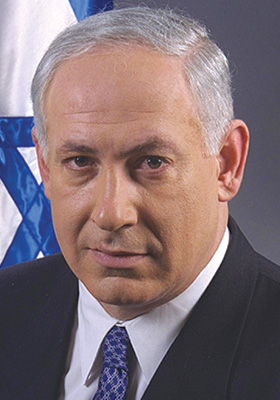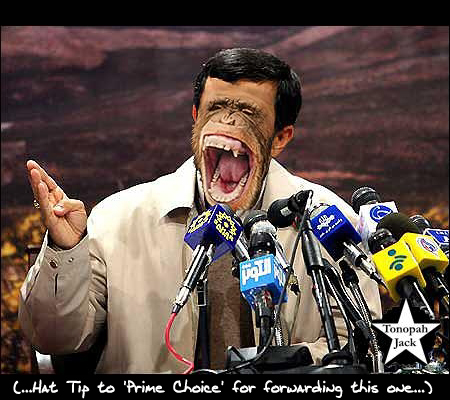
Middle East: The global stage is set for a confrontation reminiscent of Churchill vs. Hitler and Reagan vs. Gorbachev. How long will Benjamin Netanyahu tolerate an Iranian nuclear threat before acting?
Iranian President Mahmoud Ahmadinejad clearly wants to do something with the olive branch President Barack Obama has extended to him — even if what he does is stuff it into a Shahab-3 ballistic missile and fire it at somebody.
At a mega-rally for the 30th anniversary of the Islamist revolution, Ahmadinejad echoed the president's phrase in regard to U.S.-Iran relations, "mutual respect," and conceded that the Obama administration wanted "to produce change and pursue the course of dialogue."
It is clear, Ahmadinejad added, that "the Iranian nation welcomes real changes."
But whatever grand Barack/Mahmoud summits lie ahead may have just been dealt a pre-emptive strike, courtesy of the Israeli electorate.
Bibi Netanyahu, former prime minister and current Likud Party leader, has just been asked by President Shimon Peres to form a new coalition government after the close results in the recent Knesset elections.
His coalition will undeniably be fragile, depending on the support of one or a handful of the Jewish state's tiny fringe parties. But Netanyahu used his first statement as prime minister-presumptive to send a powerful message to both Iran and the Obama administration.
To the shock of many, he pointedly refused even to mention the Palestinian peace process, which has been going nowhere of late. Nor was there, again clearly deliberately, any reference made to the so-called two-state solution, which those negotiations had been aiming to find.

Just as Netanyahu's rise back to power was announced, the U.N.'s International Atomic Energy Agency (IAEA) — the self-styled nuclear proliferation watchdog — announced the surprise discovery of an extra 209 kilograms of low-enriched uranium at Iran's Natanz nuclear facility.
That means the fanatical regime has finally reached "nuclear breakout" and possesses enough fissile material for a bomb. Such an amount of low-enriched uranium would allow the manufacture of as much as 25 kilograms of highly enriched uranium, enough fuel for one nuclear device of the type that destroyed Hiroshima in 1945.
The IAEA has been telling the world that Iran was six months to a year away from this threshold — another illustration of the agency's incompetence, its Nobel Peace Prize notwithstanding.
In fact, the IAEA doesn't even know how many centrifuges Iran is manufacturing. And considering the urgency of the Iranian nuclear threat, it is incomprehensible and outrageous that the rest of the world stands for its inspections taking place only once a year.
Adding to the gravity of the situation, the IAEA also reported that a new roof has been built over Iran's heavy-water reactor under construction at the city of Arak, southwest of Tehran, a facility the regime has refused to allow inspectors to examine.
And the U.N. agency has found that the uranium traces discovered at the Syrian facility bombed by Israel in 2007 did not originate from the Israelis' bombs, as Syria claims.
It all spells the deadliest of challenges ahead for the United States and the rest of the civilized governments of the world. It seems, however, that only one leader fully appreciates the threat.
Like Churchill, Benjamin Netanyahu is calling on his political rivals to unite in a broad "national unity" coalition government.
In nullifying the Islamist nuclear threat it should not be only Israel that unites, but all of us.
Iranian President Mahmoud Ahmadinejad clearly wants to do something with the olive branch President Barack Obama has extended to him — even if what he does is stuff it into a Shahab-3 ballistic missile and fire it at somebody.
At a mega-rally for the 30th anniversary of the Islamist revolution, Ahmadinejad echoed the president's phrase in regard to U.S.-Iran relations, "mutual respect," and conceded that the Obama administration wanted "to produce change and pursue the course of dialogue."
It is clear, Ahmadinejad added, that "the Iranian nation welcomes real changes."
But whatever grand Barack/Mahmoud summits lie ahead may have just been dealt a pre-emptive strike, courtesy of the Israeli electorate.
Bibi Netanyahu, former prime minister and current Likud Party leader, has just been asked by President Shimon Peres to form a new coalition government after the close results in the recent Knesset elections.
His coalition will undeniably be fragile, depending on the support of one or a handful of the Jewish state's tiny fringe parties. But Netanyahu used his first statement as prime minister-presumptive to send a powerful message to both Iran and the Obama administration.
To the shock of many, he pointedly refused even to mention the Palestinian peace process, which has been going nowhere of late. Nor was there, again clearly deliberately, any reference made to the so-called two-state solution, which those negotiations had been aiming to find.

Just as Netanyahu's rise back to power was announced, the U.N.'s International Atomic Energy Agency (IAEA) — the self-styled nuclear proliferation watchdog — announced the surprise discovery of an extra 209 kilograms of low-enriched uranium at Iran's Natanz nuclear facility.
That means the fanatical regime has finally reached "nuclear breakout" and possesses enough fissile material for a bomb. Such an amount of low-enriched uranium would allow the manufacture of as much as 25 kilograms of highly enriched uranium, enough fuel for one nuclear device of the type that destroyed Hiroshima in 1945.
The IAEA has been telling the world that Iran was six months to a year away from this threshold — another illustration of the agency's incompetence, its Nobel Peace Prize notwithstanding.
In fact, the IAEA doesn't even know how many centrifuges Iran is manufacturing. And considering the urgency of the Iranian nuclear threat, it is incomprehensible and outrageous that the rest of the world stands for its inspections taking place only once a year.
Adding to the gravity of the situation, the IAEA also reported that a new roof has been built over Iran's heavy-water reactor under construction at the city of Arak, southwest of Tehran, a facility the regime has refused to allow inspectors to examine.
And the U.N. agency has found that the uranium traces discovered at the Syrian facility bombed by Israel in 2007 did not originate from the Israelis' bombs, as Syria claims.
It all spells the deadliest of challenges ahead for the United States and the rest of the civilized governments of the world. It seems, however, that only one leader fully appreciates the threat.
Like Churchill, Benjamin Netanyahu is calling on his political rivals to unite in a broad "national unity" coalition government.
In nullifying the Islamist nuclear threat it should not be only Israel that unites, but all of us.
Source: IBD Editorials
H/T: daledamos




















